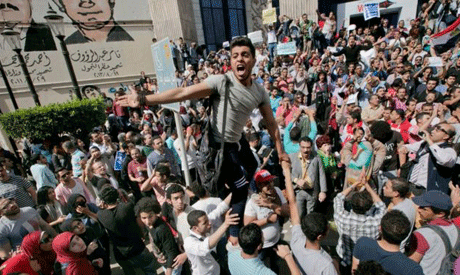
Around 200 people gathered to protest against the decision to give two islands to Saudi Arabia in April 2016 (AP)
Uncertainty looms over calls for demonstration Wednesday against the Egyptian-Saudi Red Sea islands deal after the interior ministry refused an official notification of the protest by the organising parties.
On Saturday, organisers said police refused to receive the official notification of the protest, scheduled for Wednesday from 1pm to 2pm in front of the cabinet offices, to protest the deal.
The parties calling for the protest include the Egyptian Popular Current, the Socialist Popular Alliance Party, the Egyptian Social Democratic Party, the Dostour Party, and the Karama Party.
Speaking to Ahram Online, spokesman for Egypt’s Democratic Coalition Khaled Dawoud said following a Sunday press conference by the organisers that they will remain in permanent session until Tuesday to discuss appropriate steps ahead of the scheduled protests.
"We're facing an unprecedented violation of the protests law. We're trying to respect the law, despite our objection to it, and they don't," Dawoud said.
Earlier, senior Karama Party member Maasoum Marzouk and others went to South Cairo court to file a complaint against Sayeda Zeinab Police Station following its refusal to receive the official notification for the call Saturday.
According to the organisers, the head of the court didn't express to them any readiness to send an official notice to the station following hours of waiting; therefore an official letter by mail has been sent to the interior ministry and court as a notice.
This is the first official protest to be called for since a Higher Constitutional Court ruled in December that Article 10 of the controversial 2013 protest law, which permits the country’s interior minister to bar scheduled protests, is “unconstitutional.”
Since its issuance in late 2013, the widely controversial protest law has led to the detention of thousands of youth activists, as well as secular and Islamist protesters.
The court said that those looking to organise street protests are merely obliged to notify authorities beforehand and present all needed documents as required by law, and are not required to obtain prior approval.
"This is an act of suppression. We have presented all legal documents needed as obliged by law. We're currently thinking of other legal methods until Tuesday," Dawoud added.
According to Dawoud, the organisers will not "miss any legal opportunity" to protect participants in the protest, especially after the latest round of arrests by authorities following a 2 January protest against the deal.
Last week, shortly after the cabinet's decision to approve the deal and refer it to parliament, 12 people were arrested for illegally protesting against the decision near the Journalists' Syndicate in Downtown Cairo.
Dawoud said that among other alternatives under consideration is the formation of a delegation to head to the cabinet office or Egyptian parliament and speak to MPs about their rejection of the deal.
The April 2016 maritime border demarcation agreement between Cairo and Riyadh would place the Egyptian-controlled Red Sea islands of Tiran and Sanafir under Saudi Arabian sovereignty.
The deal sparked widespread public outcry and a number of protests. Dozens of protesters stood trial for demonstrating without permits. Most have been released from jail after paying hefty fines.
Egypt’s High Administrative Court has set 16 January 2017 to rule on the government’s appeal against an earlier June ruling by an administrative court halting implementation of the deal.
Short link: